|

by Gentry Underwood
January 05,
2018
from
Medium Website
Spanish
version
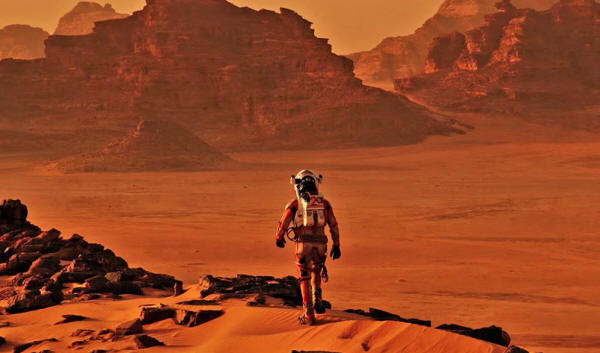
Primitive homo martis
surveying the environment
(Artist's conception, early 21st century)
Recently a friend chided me for being an Elon Musk fanboy:
"I'm so tired of all
these Muskophiles," she said when I brushed off the dig. "What
is it you're all so excited about anyway?"
"Tesla for
starters," I responded. "There's a company whose
explicit reason for existence is to disrupt our fossil fuel
addiction. While most everyone else is whining about global
warming, Elon has found a way
within capitalism to
combat it."
"But what
really gets me amped," I added, "is Mars."
"Pffft,"
she sounded with a roll of the eyes.
"Mars? I am so
tired of hearing about Mars! What
an escapist's dream - blasting off to some
other planet when it's this one that's in trouble!"
The 6th Mass-Extinction
She had a point.
The Earth is dying. It's shedding life at a remarkable rate...
Ocean
acidification is occurring at
breakneck speed with
devastating consequences to marine life, in seas already on the
brink of being
fished to death.
Studies in Germany have shown that the insect
population (Earth's thankless workforce of plant pollination) has
plummeted a staggering 75% since measurement started 30 years
ago.
And of course we all know the rest
- the earth is rapidly
heating up, the ice caps are melting - our global ecosystem is
deeply out of whack.
Worse still, this
isn't just some freak moment in history, but
the latest in a long saga of humans decimating nature. You can
literally chart a course of extinction around the globe by
tracking the migration of early humans.
Wherever we show up, megafauna (like wooly mammoths and sabretooth tigers) disappear...
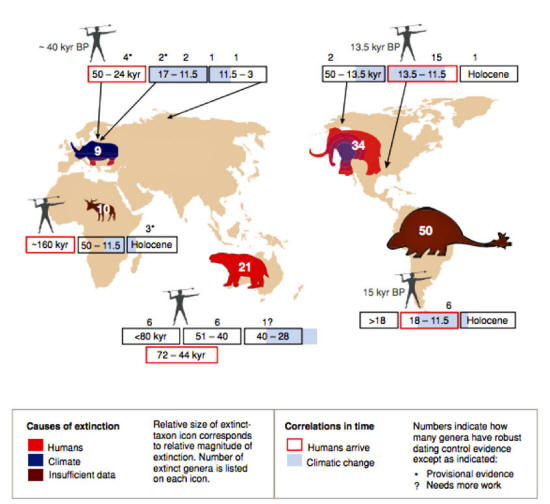
Chronology of megafauna extinction.
Koch & Barnosky (2006)
Where humans go,
the death of life follows...
We're not just a keystone species,
we are hands-down the single most destructive force to impact this
planet since a large asteroid took out the dinosaurs (and
75% of life on Earth) 65 million years ago.
Put succinctly,
humans are the 6th mass extinction.
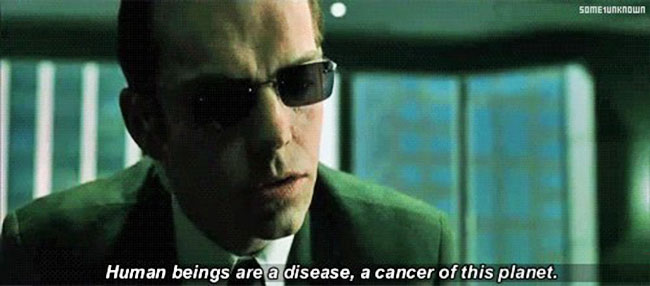
Agent Smith
was onto
something
Yeesh...
-
The idea
that our planet is dying? Terrifying.
-
The idea that
we're the reason why?
Horrific.
-
What the hell does one do with that?
Surprise, we're the bad guys?
That's not the kind of story most people are eager to believe.
Well, depression,
for starters.
If you haven't already felt that sickening "oh
god" feeling in the pit of your stomach, chances are you'll
find little of value in the rest of this post. Nothing I'm about to
say will sound the least bit reassuring unless you're already
painfully aware of the depth of shit we're in.
If there is hope
here, it's in the idea that we might find some way to change this
pattern.
To stop destroying the planet that gives us life and start
stewarding it instead.
-
But how would such a change occur?
-
How would
8 billion humans transform from self-interested actors who are
unintentionally devouring the planet into considerate, capable
caretakers of a global ecosystem?
That's not the kind of change
that's going to just happen on its own.
Original Sin
If there's a way
forward, it must begin with understanding the present.
-
What is it
about humans that results in our current situation?
-
We don't
want to destroy the
planet, so why does it happen?
Many have argued
that the fundamental problem is
technology, man's attempts to better himself through the
creation of ever-more-powerful tools that (unfortunately) have
ever-more-complicated side effects.
Some point to
industrialization as the moment our relationship with the
Earth began to turn.
Others say
agriculture is to blame: that when we went from being
hunter-gatherers to food cultivators, the resultant cultural
revolution took us out of a 'garden of Eden' and into (broken)
civilization.
In each case the basic idea is the same:
humans "inadvertently"
harm both their world and themselves when they attempt to
reshape nature for their own purposes.
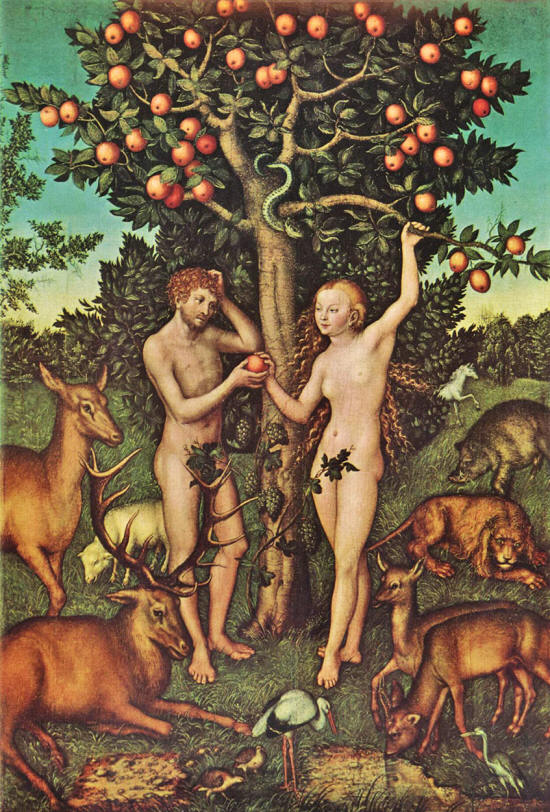
Live with nature or
separate
that-which-serves
from the rest?
This narrative is
- quite literally - as old as they come...
In ancient Hebrew, the
forbidden tree that ends Man's tenure in Paradise is called
עֵץ הַדַּעַת טוֹב
וָרָע, or the tree of
knowledge of good and evil.
Humans, the Bible opens by telling
us, once faced a fundamental choice:
dare to divide the world into
good (literally "that which
is valuable to us") and evil
(that which is not), or accept life as it was.
And humans, the
story goes, chose poorly.
But this most
ancient of moral dilemmas presents us with an impossible situation,
for there is no world where humans exist in harmless camaraderie
with nature.
If this is indeed the fundamental problem, then there
is nothing for us to do but give up, for there is no version of
reality where man can not
eat from such tree and still survive.
Our very existence derives
explicitly from our unique ability to coordinate our creative
capacities to reshape nature - it's only by separating
good from
evil that humans are here
at all.
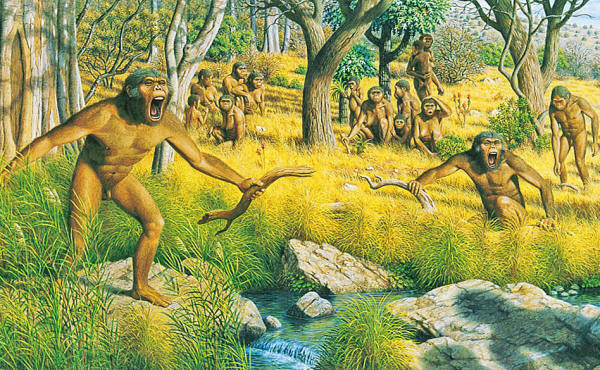
How does a band of
apes fight a lion?
Homo sapiens,
literally "wise men", share roughly
98% of DNA with chimpanzees (for comparison sake, we share 99% with
one another and 50% with a banana).
Once, a long time ago, we were
little more than monkeys ourselves,
forced onto the savannah when climate change destroyed the forests
we'd long called home.
Evolution is born
out of necessity:
those primates who left the forests for the
savannah and didn't
repurpose nature to suit their needs didn't survive.
Our ingenuity
is an essential part of our existence - the predators in our early
days demanded it.
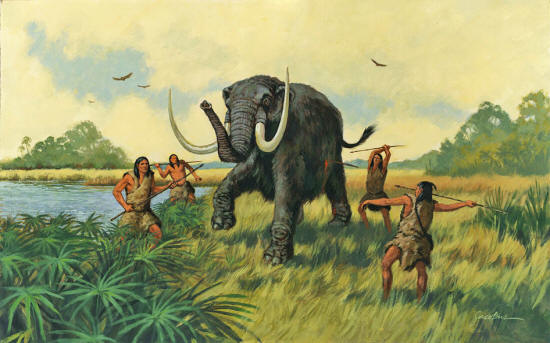
Creative
working-together
is what made humans
the
threat-neutralizing machines
we are today
If this creative
reshaping of nature is fundamental to
homo sapiens, then we can't
pick some moment in our past and say "there's where we made a wrong
turn".
-
Not when we learned to shape sticks into spears, or to speak
to one another using symbolic language.
-
Not with our domestication
of fire, or animals, or plants.
-
Not with the agricultural cultures
that rose up in the Fertile Crescent, nor the invention of
industrialization, nor the Information Age.
These are all
incremental consequences of our fundamental nature - without them
there simply would be no humans at all.
If there's never
been a version of "human" that didn't possess this fundamental
ability to transform nature, can we look to any other aspects of
ourselves as the source of our planetary woes?
I've come to believe
the fundamental issue - man's
original sin - runs even deeper: it's our past as chimps,
grazers of bountiful forests, that leads to the current
mass-extinction.
What brings us now to the brink of our own
destruction is the simple fact that we're born from a world of
plenty.

Our ancestors roamed
these trees,
picking fruit along
the way
Homo sapiens
is the result of an evolutionary system that rewarded
collective innovation.
By this ability, this
virtue in the
literal sense, we have taken over the world, outsmarting the
fiercest of predators and overcoming most obstacles of
nature. But for most of our history, that evolutionary
system hasn't demanded we learn how to thrive without
abundance.
Our environment has not required us to think
ecologically or develop the capacity to keep an ecosystem in
balance.
Those just
aren't skills most humans have had to develop in order to
survive.
And that's
where Mars comes in...
Elon
Musk says he wants to go
to Mars because of all the ways
that humanity on Earth can be destroyed.
Whether by global
thermonuclear war, planetary climate change, or some rogue
asteroid, there are just too many scenarios where we all end
up dead.
Mars, he argues, presents
an opportunity to safeguard the humans species by
backing up our DNA on a second planetary hard drive.

SpaceX:
salvation or just more of the same?
While this
argument seems reasonable, it's not what gets me so excited.
If our primary purpose for going to Mars is to preserve the
human species, I think I'd have to agree with my friend that
our efforts would be better directed towards fighting the
most likely existential threats back at home.
Why pour so
much energy into fuel-guzzling rockets when our real issues
are rockets and fuel-guzzling in the first place?
To me, what
makes colonizing Mars appealing is not the chance to back up
human beings, but
the opportunity to
give birth to an entirely new species,
much like what our move from the forests to the
savannah kickstarted nearly 2 million years ago.
Homo martis
Darwin's
theory of natural selection is perhaps best represented by
his finches - those sweet little birds he discovered in
the Galapagos.
Presumably all descendants of a common
ancestor, as they evolved from generation to generation in
their individual micro-ecologies, each version of the finch
became distinct.
Small,
environmentally-serving variances compounded over time to
produce something new and different on each island.

Darwin's finches - each
beak suited
to the particulars of
its corresponding environment
The
diversity of human forms tells a similar story.
Presumably
we all come from a common set of ancestors, but over time
races developed various physical differences in response to
different environmental demands around the world.
Like
Darwin's finches, our environment shapes who we become.
Homo sapiens
is the evolutionary product of
a fertile gem of a planet. Biologically speaking, our
relationship to Earth is that of an entitled child to an
exceedingly gracious parent.
But on Mars, an entitled child
can't survive. For humans to exist on Mars, they'll have to
carve gardens out of stone. Everything, from the air they
breathe, to the food they consume, would have to be
cultivated, grown, shaped, made.
For where Earth is Eden,
Mars is a wasteland.
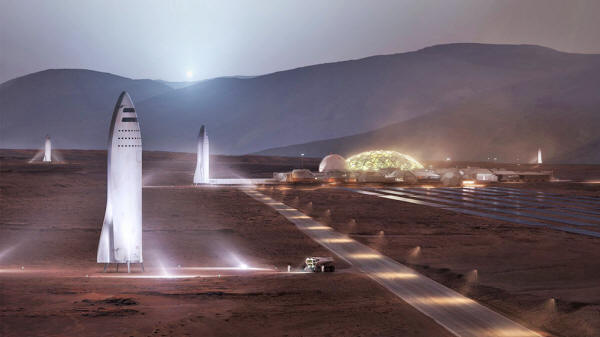
Early Martian
colonization
would be no picnic
Musk talks
about backing up humans, but I suspect he recognizes that
once enough time has passed the two planetary species won't
be copies of one another.
As with the finches, given enough
time we can expect a pretty different kind of human to
evolve on the Red Planet compared to those on Earth.
The
distance between the two 'islands' is vast, and the
environments could not be more dissimilar.
If Martians
survived and managed
to terraform their red planet into blue
and green,
Bringing it home
Just as
finches and humans evolve, so too does human culture.
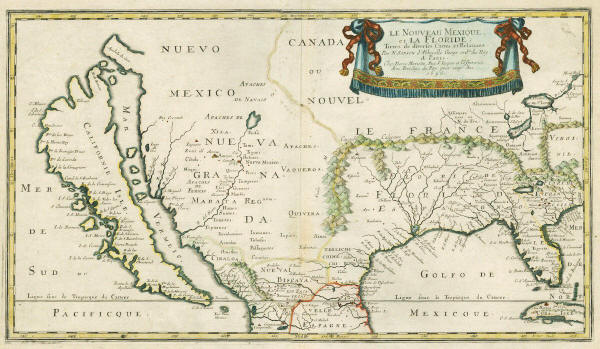
Undiscovered country
is breeding ground for
new ideas
And new
lands mean the opportunity for new cultures - the chance
to try out new ideas and new ways of working together.
It's
no coincidence that liberal democracy was first proven in
the Americas, for instance: here was a land without a
powerful ruling class to stand in the way of
experimentation.
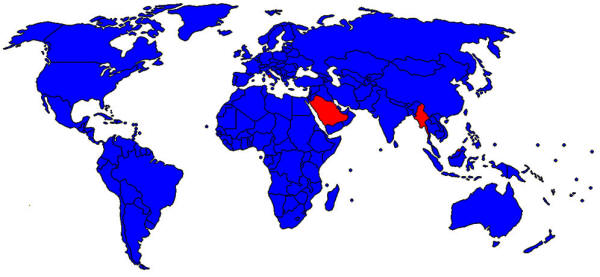
On the
surface, at least,
nearly the entire planet is now
democratic
But new
ideas don't just grow where they're planted.
After North
America was transformed from a pioneer's wonderland into a
sandbox for liberal democracy,
the resultant culture spread
like a disease.
It wiped out monarchies and dictatorships
across the globe, invading host countries and transforming
them from the inside out.
Of course, the transformation has
been far from consistent - each land re-shapes Western
culture in a way that's more suited to its own environment
- but overall the impact has been tremendous:

It's easy to
get down
about the
state of the world,
but we've
made a lot of progress
The point
is not that Western civilization is
all that (we can
see from current events that it obviously isn't) but that
the culture born in North America eventually infected the
rest of the world. And the same thing can happen with Mars...
No matter
how badly homo sapiens
end up devastating the Earth, it's doubtful we'll be able to
produce anywhere near the level of desolation that
homo martis would
be born into.
Large-scale ecological wastelands will be her
native habitat.
She'll be a species with a planetary green
thumb.

Some assembly
...required
-
What kind
of impact might that kind of stewardship-oriented species
have on this planet?
-
How will the lessons we learn on Mars,
and the way that planet shapes us, change how we care for
life over here?
-
Might
homo martis be able to reverse the destruction of life
that has become a hallmark of
homo sapiens?
Of course,
we might not make it.
Mars is - in every imaginable sense
- an incredible longshot. And at the rate we're destroying
Earth our own civilization might collapse before we manage
to even get started.
But it's also a place where humans
might internalize what the majority of us have never learned
here:
how
to care for the world we're a part of.
And it
seems pretty clear we're going to have to master that if
mankind is going to survive at all...
|















